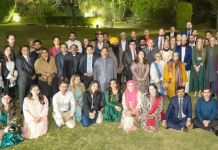ISLAMABAD, OCT 19 /DNA/ – A new Knowledge Brief published by the Pakistan Institute of Development Economics (PIDE) emphasizes the urgent need for gender-sensitive reforms in Pakistan’s criminal justice system. Authored by Dr. Fida Muhammad Khan, Assistant Professor at PIDE, and Zainab Fatima, Researcher Women Aid Trust, the study titled “Gendered Pathways to Crime” challenges the assumption that men and women engage in criminal behavior under similar circumstances. It argues that the pathways leading to crime are profoundly shaped by gender, social expectations, and structural inequalities that disadvantage women from an early age.
The study explains that women often experience unique forms of trauma, marginalization, and abuse that increase their likelihood of becoming involved in criminal activity—factors that are rarely recognized by existing laws or institutions. Although laws are written to apply equally to all, their implementation often overlooks the intersecting effects of gender, poverty, and class. The authors highlight four major pathways discussed in GPT literature, that frequently lead women into crime: childhood trauma and abuse, drug misuse linked to emotional or economic stress, violence from intimate partners, and socio-economic coercion including sex work. These pathways are reinforced by systemic inequality, patriarchal norms, and limited access to justice, making women’s experiences of crime and punishment significantly different from those of men.
The brief also highlights that Pakistan’s colonial-era criminal justice system continues to operate under gender-neutral assumptions, focusing primarily on the act of crime rather than its underlying causes. It documents instances where women have been coerced into false confessions through threats of humiliation or sexual violence, exposing deep-rooted power imbalances in law enforcement and judicial processes. The authors argue that recognizing gender as a key factor in understanding crime is essential for achieving fairness, preventing reoffending, and ensuring justice.
To address these issues, the study recommends comprehensive reform of Pakistan’s criminal justice system through gender-sensitive policing, judicial training, and the creation of women-only police divisions and prosecution units. It also proposes revising sentencing guidelines to reflect gendered pathways to offending and expanding academic and policy research on women offenders within South Asia. Such efforts would help build a justice system that recognizes women’s lived experiences and addresses the structural and cultural barriers that contribute to their criminalization.
While the Gendered Pathways Theory (GPT) has been extensively studied in Western contexts, the authors emphasize the importance of developing localized research in Pakistan and other post-colonial societies. Contextualizing GPT within South Asian realities is vital to understanding how social hierarchies, cultural expectations, and colonial legacies shape women’s vulnerability to crime today.

















